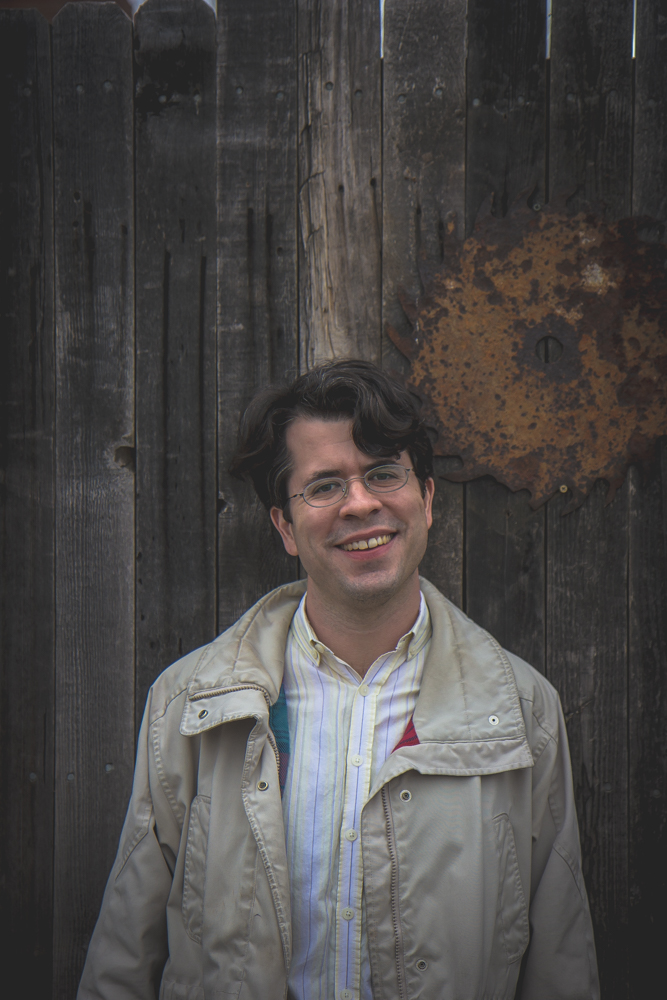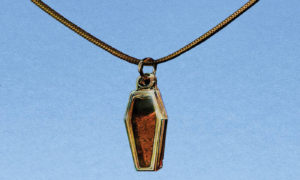 I was first exposed to Daniel Francis Doyle on YouTube, seeing a guy in a sweaty gray heather tee shirt playing a natural-finished Fender Stratocaster with a dry overdriven sound in a room claustrophobically packed with acoustic guitars, mandolins, a drum set, unused cymbals, lamps, and a xylophone. But in the middle was Daniel wearing a headset with one of those black foam ball microphones positioned directly in front of the mouth—like what Michael Jackson wore when performing live, or maybe an online gamer. He went into a few glitchy guitar passages with some fancy fingerpicking, part of a greater looping scheme. With every passing, the piece grew, existing layers chorused with new parts. Overdrive and distortion built with frenetic anxiety as Daniel positioned himself on the drum throne.
I was first exposed to Daniel Francis Doyle on YouTube, seeing a guy in a sweaty gray heather tee shirt playing a natural-finished Fender Stratocaster with a dry overdriven sound in a room claustrophobically packed with acoustic guitars, mandolins, a drum set, unused cymbals, lamps, and a xylophone. But in the middle was Daniel wearing a headset with one of those black foam ball microphones positioned directly in front of the mouth—like what Michael Jackson wore when performing live, or maybe an online gamer. He went into a few glitchy guitar passages with some fancy fingerpicking, part of a greater looping scheme. With every passing, the piece grew, existing layers chorused with new parts. Overdrive and distortion built with frenetic anxiety as Daniel positioned himself on the drum throne.
CRASH.
CLANG.
And off he went with hardly enough time to grab the sticks before beginning to sing along: “There are two of you…and there are three of me.”
Daniel Francis Doyle arrived in Austin twelve years ago at twenty-three years old from the Dallas area, ready to make a name with his band Early Lines and two of his best friends he’d known since 15. “One guy got a head start a little bit and then we eventually kind of broke up, and that’s when I started performing under my own name.” This was in 2005, a time when Austin was only really beginning to pick up its developing pace. I ask him what his live set up was. “It was a full drum set and then there were guitar loops. So I would record all the different parts of the song on my guitar loop pedal, set it all up and then sit down at my drum set and control the loop pedal with my foot while I played drums and sang. And the earlier stuff was really harsh. Harsher, kind of loud, kind of nervous, fast music.”
A one-man band can call to mind images of busking musicians with gimmicky street tricks on viral YouTube videos. But as in that first video I saw of Daniel, I can tell there’s something deeper here. Something more developed. More real. But why just his name? “I was going to do a moniker or something and I couldn’t think of one and my friend who was my ex-bandmate at [that] point said, ‘Well you’re not a band, you’re just a guy. Just go by your name.’ And I was like, ‘Oh yeah,’ and then I thought it would be funny to go by my full name. It’s kinda like, not funny, but an in-joke for myself I guess. It kind of sounds like the kind of name you’d expect from a singer-songwriter but at the time I was screaming and playing drums to feedback, so the contrast to that I thought was kind of humorous or something.”
These days, Daniel plays in a three-piece band called Daniel Francis Doyle & the Dreams, made up of Luis Martinez on drums and Nemir Naayem on bass and keyboards. Today, he sheepishly answers my questions at the Buzzmill coffee shop on East Riverside, the neighborhood we share, as if these are questions he doesn’t really think he should answer, as if there are more important things to be doing. He coughs. “I have to cough again. [coughs] I still have a lingering cough from the virus that plowed through my week last week.” He readjusts himself, straightens his hair, and fixes his collar on the same shirt I’ve seen him wearing in a few photos and videos. Who is Daniel Francis Doyle with gray hairs scattering his pushed-aside bangs and khaki trousers? His name sounds more like the author of a popular turn of the century detective series rather than a guy that plays intricate guitar melodies first and then furiously bangs the drums and sings with a headset microphone. “Do you embody something else when you perform, or is it more transparent?” I ask him.
“I think it’s more transparent. Yeah, I think its always pretty transparent. Yeah, I’m thinking about that, making sure I’m not glossing over anything…yeah I mean it’s definitely always just feels like me,” he answers honestly, plainly. Given his music, which is uncluttered, clear, and present, I see his answer as an appropriate one. The guitars are up front and his particular esoteric style is transparent. Daniel does Daniel. He doesn’t fit into a particular style or genre and artfully breaks those typecasting molds, building a fluid sound and creating the kind of music he hears in his head. I ask about the songwriting process, attempting to figure out how DFD finds these songs: “Do you have particular rituals that you need? Do you need coffee, or you need a beer, do you need to be in a particular room? Time of day?”
“No, I never make myself do it. I usually end up typing in lines on the Notes app on my iPhone or sing melodies into my iPhone as I’m walking somewhere. So there’s not rituals, it’s like whenever a line will come into my head.” So we know now that Daniel is a conduit; a conducting rod of abstract one-man banded eccentricity that emits bolts of feedback and harsh crash cymbals. But how does he see it?
“[Guitar is] the instrument I’m best at probably,” he says.
“But you play drums…,” I reply.
“Yeah I’m least competent at drums. And then the bass, I’m pretty alright at bass. But even guitar, I couldn’t like, there’s a lot…it would be hard to integrate myself into a band as a guitar player, to do a job for someone, you know? That could be difficult…” He admits to being drawn to pop music and paying attention to Motown rhythms, but craves the sound of the politically charged Minutemen, and pursues the spirit of bizarre avant-gardists, Red Krayola, a band who once attached a contact microphone to a piece of aluminum foil and then placed it under a melting block of ice to capture the sound (music?) of the ice. When one has this diverse range of influences, we can only guess what will come out the other side.
I ask him when he wrote his first song. “I mean, probably when I was like 14 or 15. Getting into indie rock and punk rock in the mid-90s, and starting to feel like you could do it [emphasis added]. You could just do whatever you want. And you don’t have to have a cool sounding voice. You could have a gross, weird sounding voice and it didn’t matter. It was the most exciting time ever cause the possibilities were endless of what you could do. You didn’t have to sound cool like cool sounded on the radio or something.”
You didn’t have to sound cool; you could do it; you could do you. A novel idea perhaps in our age of curated digital personas where “cool” is the person.
We begin talking about live music in Austin and he tells me that he prefers Cheer Up Charlie’s to any other live venue in town. “I think there’s a whole culture behind Cheer Up Charlie’s too, you know, it’s not just a venue and they proved it when they moved and everyone followed along. I heard a couple people from other venues in that area, kind of, not complain, but like, ‘They have it so easy, and everyone goes to Cheer Up’s,’ and I’m like, ‘Well, because it’s not just a bar or a faceless venue. There’s a culture behind it.’” And he’s right. There’s a concerted effort to be different, and the difference seems to be honest. Cheer Up Charlie’s co-proprietor Tamara Hoover is quoted in the most recent True Sincerity saying, “The mission has always been: open doors, find out who you are here, meet somebody new, try something new.” And I think this rings true to Daniel who acts transparently, constantly trying to figure out who he is creatively and what his purpose is.
And that purpose is changing. It always is. I ask him if he desires to leave Austin, to test his mettle in a new city. He tells me he’s heard folks in other cool cities refer to Austin as the “velvet coffin,” meaning it’s a pretty comfortable place to die, which is confusing to me because I never thought death ought to be more uncomfortable than it already is. Now 35, Daniel tells me he’s been in Austin for 12 years and that he has a “wonderful support system here of friends and now family. And that’s kind of keeping me here. I had a, I think I’ve had, in relation to how many people play music in Austin, a pretty good run here and feel grateful for all the great shows I’ve played over the years and all the people who I’ve met and it’s just a nice place to be.” This comes from the man who toured the country over five weeks taking Greyhound buses from tour stop to tour stop with his nylon string guitar in his most naked performing style. To leave the “velvet coffin” and enter the most frightful place on our nation’s highways alone, save for an acoustic guitar and sing to a room full of strangers is not comfortable but quite daring.
I ask him how he recovers from bad shows and he tells me, “You look forward to the big cities and the next shows. In El Paso, I looked forward to Albuquerque and Albuquerque sucked and I look forward to Phoenix and Phoenix sucked and then I looked forward to L.A. and L.A. was a really good show.” You look forward and go there. Sometimes you have to just suck it up and take the Greyhound.
I press him more and ask him to define success as a musician. “Well you know, I’m a big Guided By Voices fan and Rob Pollard, I think, said it perfectly. He said, ‘Just making a record you like.’ I think it’s that simple. Making a record you’re proud of. I think if you make exactly what you wanna make, and that can be an atonal noise record, or someone trying to make a perfect pristine pop album, if it’s exactly what you want to do and you do it, then that’s a success. And then maybe this is a little more naïve perception on my side of things, but if you’re serious about it, well I don’t want to say ‘serious,’ but [if] you’re genuine enough about it, and you stand behind, I feel as though that will resonate through somehow and attract people to listen to it. That’s a kind of naïve, optimistic perspective, and I’m not sure that’s true or not, but I just have this feeling that things work out that way.”
Daniel Francis Doyle is a dreamer and he leads his band, the Dreams these days, performing at Cheer Up Charlie’s, Hotel Vegas, and on-air at KVRX. He doesn’t see the advantage to making CDs if you don’t have the money. “I think there’s a place if you can afford them and people are going to buy them. It’s indulgent, and I don’t mean that in a negative way…it feels good as a band to have your music committed to something physical. And that’s totally cool, I don’t look down at it, but it’s not necessary and in fact, if you want to look at the long-term, or if you’re struggling or have a goal, you should probably just forget about it and not put one out. You know I come from a time, well I’m not that old, I’m 35, but I remember in the late 90s, you put $1,500 or more dollars into a 1000 run CD release and it’s this ridiculous waste of money. It’s insane, these days, at least. I feel like if you’re on a budget put your money elsewhere.” As a touring band/man Daniel finds solace and peace sitting on a Greyhound bus, hoping his guitar, the reason he’s in this mess, doesn’t get lost on his next transfer; that there’s at least a few people at the show tonight; that he gets to the show tonight; that maybe he’ll get to sleep some place other than the headlining band’s cold floor and that he’ll be able to find his way some 500 miles before 8 p.m. to do it all over again the next day.
“I got a show opportunity up in Chicago? Cool, I’ll plan a tour around it. Nice. Here we go. Get someone to cover my shift real quick, I’m outta here, don’t care if I lose the job anyways, this is what my obsession is,” he says hypothetically, referring to his past as a mid-to-late twenty-something, touring constantly and disregarding any future that doesn’t have Daniel Francis Doyle on the bill. But things change: “I don’t want to be forty and waiting tables and looking forward to a ten-day bus tour. I want to be thinking about other things now…I owe it to my 50-year-old self and see if there’s another way of functioning as a person.” But he assures me that this is not a simple black or white scenario, that he can manage both but no longer will he devote his “whole self” to it. Perhaps he doesn’t need to in a way that belies the true pleasurable spirit of the act. No longer does Daniel work at it. He has retired and is beginning to enjoy the view.
He and the Dreams have a 7” record of four songs being released by new local label Punctum Records, an imprint of Punctum Books that sports a roster of some of Austin’s most sincere artists. “We recorded them a year ago. And then, we move real slow. There’s no rush anymore.”











